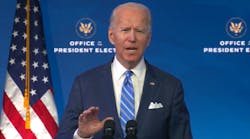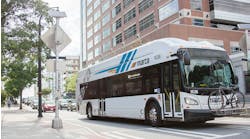The $1.9 trillion American Rescue Plan Act of 2021 passed the U.S. Senate on March 6, 2021. The bill will return to the U.S. House of Representatives for a vote. The House previously passed the legislation at the end of February and the bill that has passed by the Senate includes $30.5 billion for the transit industry, as well as $1.7 billion for Amtrak.
The American Public Transportation Association (APTA) said the legislation provides transit agencies critical emergency funding that will allow their services to continue to serve communities throughout the nation.
“We greatly appreciate that the bill includes $30.5 billion of emergency transit funding and distributes these funds in a manner that ensures that all public transit agencies can continue to be a lifeline for our essential workers, while also ensuring Americans can get to vaccine distribution sites and communities can rebuild from the economic devastation caused by the pandemic,” said APTA President and CEO Paul Skoutelas. “The time is now to invest more in our nation’s public transportation infrastructure to support jobs, reconnect Americans and build the necessary infrastructure network to provide critical public transit services and economic opportunities for all.”
The California Transit Association noted the funding provided in the legislation would aid the state’s transit agencies “better navigate the long recovery process” as the nation looks to life beyond the COVID-19 pandemic.
“Like other critical industries, public transit was impacted catastrophically by the COVID-19 pandemic. Faced with unprecedented budget deficits caused by depressed ridership, reduced sales tax and fare revenues, and the high cost of implementing health and safety measures designed to keep our workers and riders safe, transit agencies were forced at the start of the pandemic to slash service, delay capital improvements and furlough employees,” said California Transit Association Executive Director Michael Pimental. “This funding is critical to a balanced and equitable economic recovery, to our quality of life and to achieving our state’s ambitious environmental goals. We look forward to President Biden signing this bill into law and delivering urgent relief to the American public and industries essential to our nation’s recovery as quickly as possible.”
What’s included in the American Rescue Plan Act of 2021
While much of the transit text remains the same between the House and Senate versions; there are a handful of notable changes.
The funding provided for Amtrak has increased from $1.5 billion to $1.7 billion, which includes $970 million for Northeast Corridor grants and $730 million for National Network grants.
Additionally, the funding provided for qualifying Capital Improvement Grants (CIG) Program projects had included the Federal Transit Administration’s Expedited Project Delivery Pilot Program, but, as APTA explains, the provision allowing this was removed from the Senate version following a point of order under the Byrd rule.
The $30.5 billion for transit includes:
- $26.09 billion for urbanized area formula grants;
- $317 million for rural area formula grants;
- $50 million for mobility for seniors and persons with disabilities grants;
- $100 million for non-urbanized intercity bus program recipients;
- $25 million for planning grants;
- $2.21 billion in grants for recipients in need of financial assistance to maintain operations over and above the aid that has been provided; and
- $1.68 billion for qualifying projects in the CIG Program, which includes $250 million for Small Starts projects and $1.43 billion for New Starts and Core Capacity projects. An APTA analysis found 23 projects would be eligible for these funding allocations.
The House is expected to vote on the bill the week of March 8. If passed, the bill will then head to President Biden’s desk where he is expected to sign the legislation.







